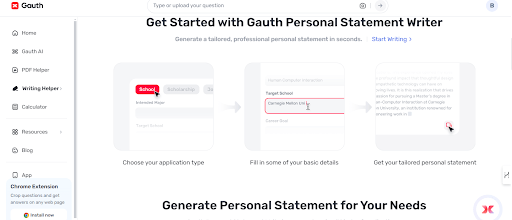For students, creative writing tasks are a necessary component of their education. It supports accountability, aids with time management development, and validates what they learn in class. Still, parents and instructors may need help encouraging students to manage their school work effectively.
Although students naturally need direction early on, encouragement of a feeling of responsibility can help them develop better study habits and academic performance as they age.
This blog will go over practical ways to inspire students to take ownership of their written work, go beyond typical challenges, and how writing tools like Gauth could help them handle their tasks, including using an AI PS Generator to assist with their personal statement writing for example.

Challenges and Solutions for Students Struggling with Creative Writing
Although creative writing tasks create challenges that keep students from owning them, helping them to become more responsible requires an awareness and resolution of these obstacles.
Following are some typical challenges and possible solutions:
1. Lack of Drive
Many students may find it challenging to understand the goal behind written work. They might see it as a burden or something they must overcome, not as a chance for practice and learning. Students could hesitate to do written school work independently without knowing why it’s essential.
2. Inadequate Time Control

Especially when mixing schoolwork with extracurricular activities, recreation, and family obligations, students may need help with time management. Without appropriate direction, people can feel overburdened by the task or leave projects until the last minute. While parents want to help their children do their schoolwork, pupils may start depending too much on adult assistance when this aid becomes excessive. This lessens their possibilities of growing in autonomy and compromises their capacity to own their work.
3. Specify Expectations
Knowing what is expected of them helps students take ownership of their school work. They must do their assignment on time and to the best of their abilities. Talk about deadlines, the need for organisation, and the need for work. Teachers and parents should have reasonable expectations that challenge but don’t overwhelm their children. Giving kids reasonable objectives will help them develop confidence through their obligations.
4. Divide Work Into Shorter Steps
Extensive or complex tasks might feel overwhelming to students, which causes delay or avoidance. Dividing school work into smaller, doable activities might help to reduce the anxiety around the process. For instance, if a student has a project due, help them divide it into smaller components, including material collection, concept drafting, and report writing. The one-step-at-a-time approach will help pupils feel successful as they go, strengthening their capacity to finish projects independently.
5. Appreciate Work, Not Only Results

Encouragement goes a long way in enabling pupils to own their school work. Praise students for their effort and hard work instead of concentrating only on grades or results. Even if the outcomes aren’t ideal, honour the time and effort people invest in finishing projects. By delivering step-by-step directions and explanations, Gauth offers individualised assistance that enables students to take responsibility for their written statement tasks.
Whether they need help organising their assignments or are dealing with a challenging arithmetic issue, writing tools can guide students through difficulties and offer the support they need when facing obstacles. This mix of direction and freedom helps students acquire the skills required to assume responsibility for their education.
6. Identifying Difficulties in Learning

Students who often struggle with school work, even if they try, they might have an underlying learning disability. Under these circumstances, parents and teachers should cooperate to evaluate the issue and provide more tools or help. Early identification of difficulties helps avoid frustration and fosters a more favourable connection with schoolwork.
7. Fostering a Growth Mindset
Students who believe that they’re “just not good” at a particular subject may be less likely to take responsibility for their homework in that area. Encouraging a growth mindset—where students understand that skills and intelligence can be developed through effort—can help them overcome this mental barrier. Reinforce the idea that making mistakes is part of learning and that perseverance leads to improvement.
Conclusion
Helping students take responsibility for their written work is crucial in building the skills they’ll need for future academic success. By fostering independence, teaching time management, and offering the right balance of support and accountability, parents and teachers can empower students to take ownership of their education. With tools like Gauth, students can navigate challenges and become more confident, capable learners. As students grow and develop these skills, they’ll be better prepared to face more complex assignments, ultimately building a foundation for lifelong learning and responsibility.
Author Profile

- Passionate education content creator and designer, contributor, writer and content marketing allrounder.
Latest entries
 learningDecember 17, 2025How to make School Handouts more Accessible for all Learners
learningDecember 17, 2025How to make School Handouts more Accessible for all Learners learningDecember 15, 2025Why Critical Thinking and Evaluation Skills Matter in Psychology Revision
learningDecember 15, 2025Why Critical Thinking and Evaluation Skills Matter in Psychology Revision ed techNovember 7, 2025The Importance & Benefits of Titrators in Modern Science Classrooms
ed techNovember 7, 2025The Importance & Benefits of Titrators in Modern Science Classrooms language learningSeptember 5, 20256 Creative Paths to Learning Italian with Ease
language learningSeptember 5, 20256 Creative Paths to Learning Italian with Ease







